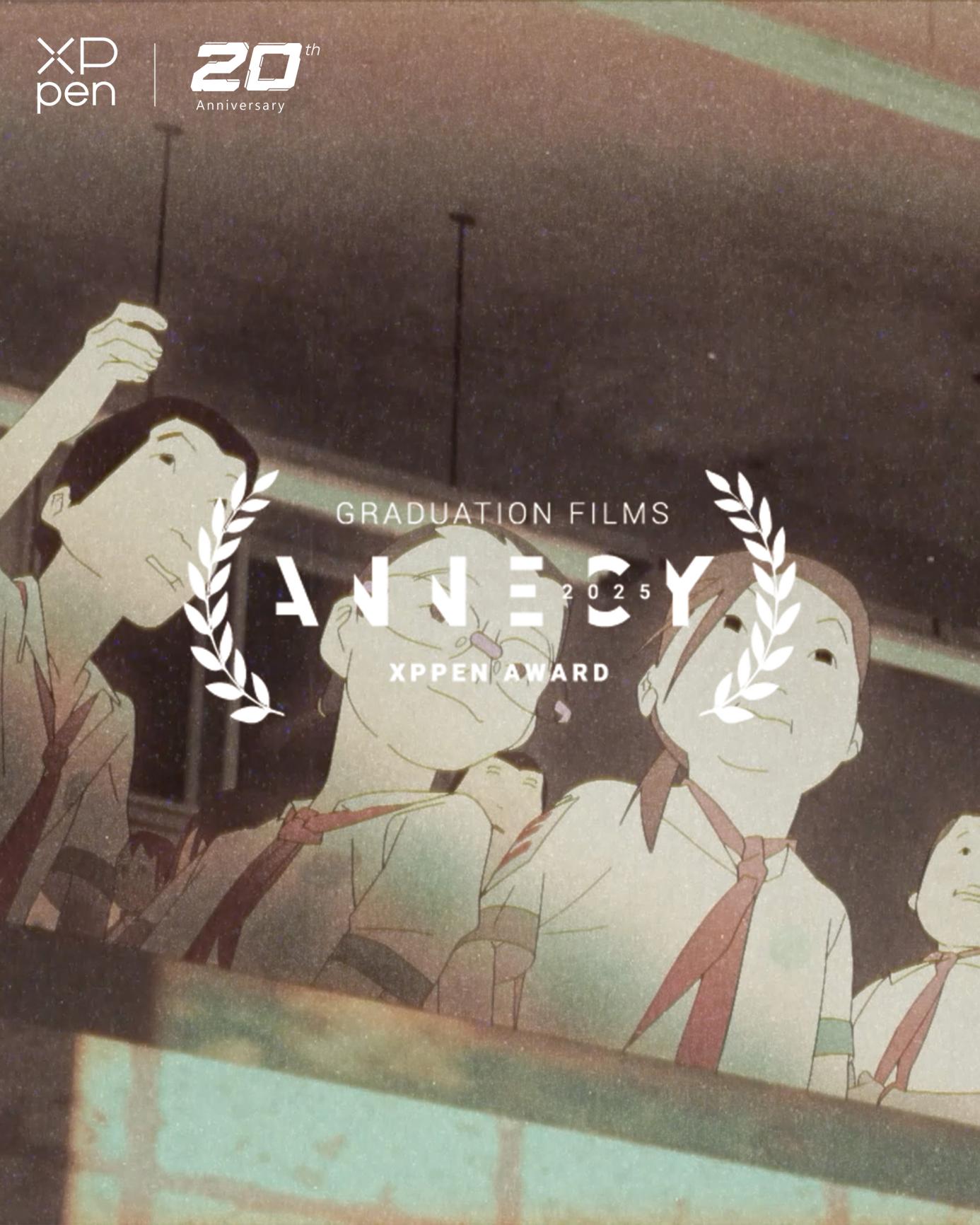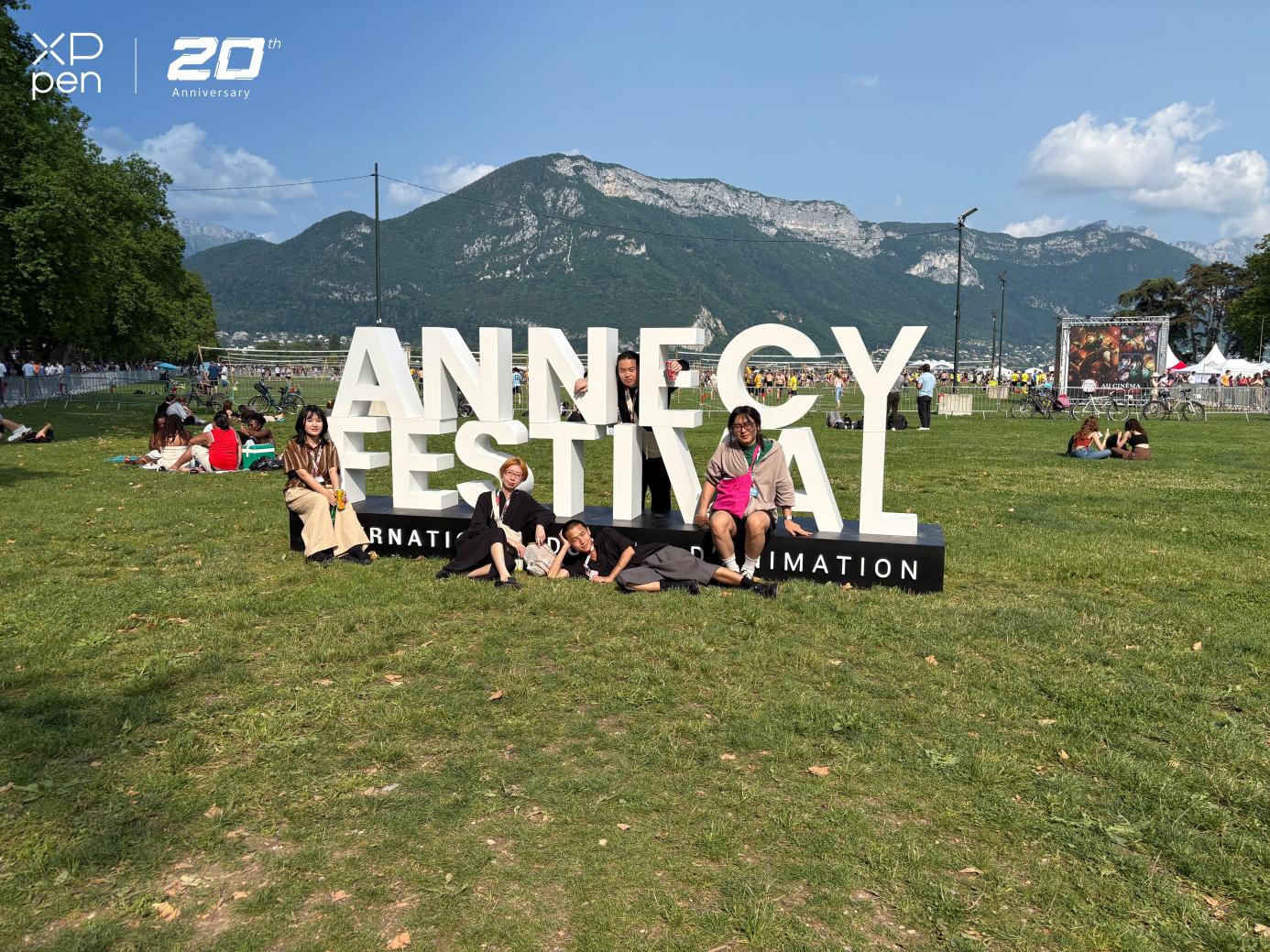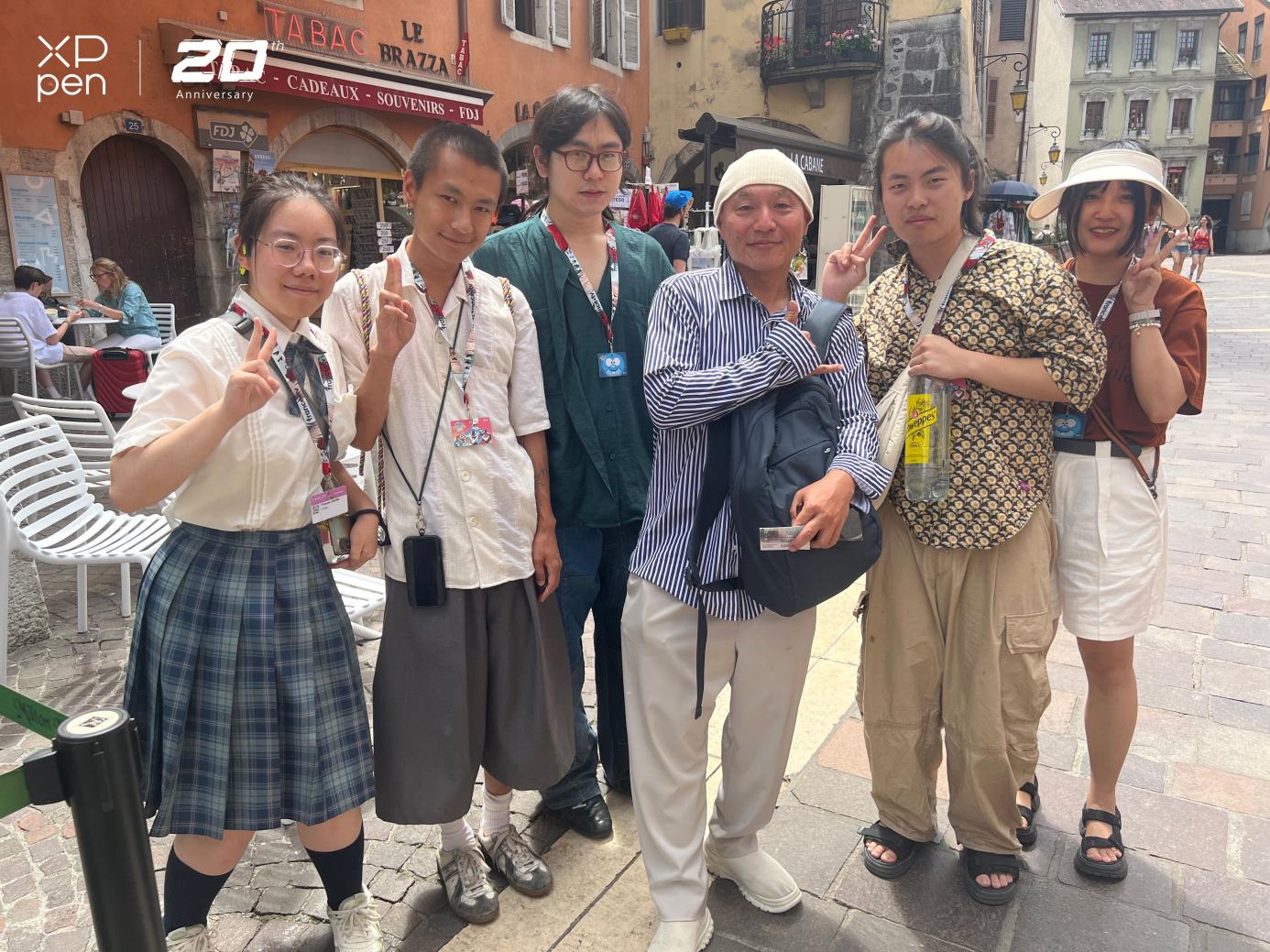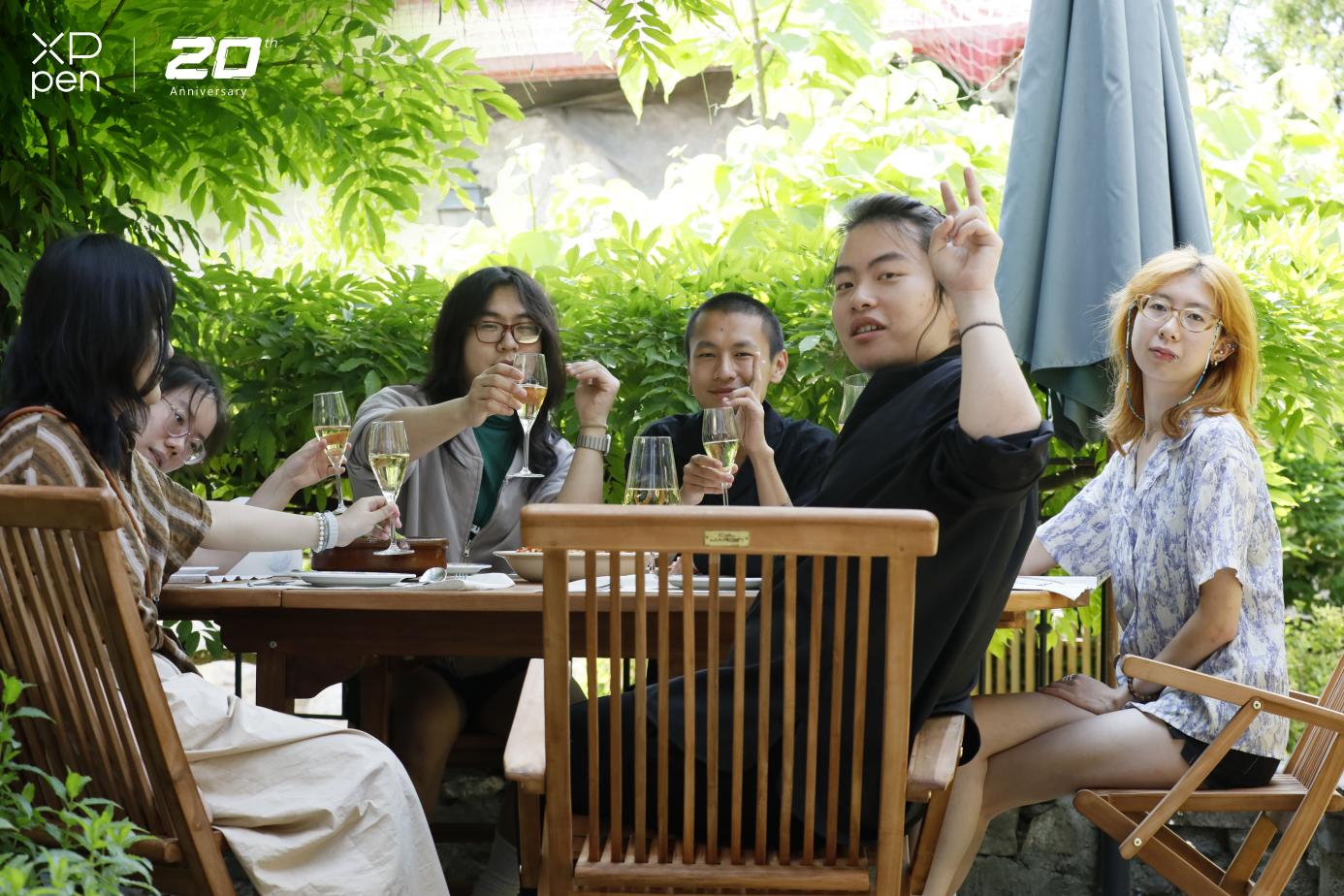XPPen Celebrates 20 Years: Engaging with the Winning Team of the XPPen Special Award at the Annecy International Animation Film Festival
——Through art, intertwining the past and the future, capturing fleeting moments.
When dreams shine into reality, the brush finds its direction. In conjunction with its 20th anniversary, XPPen has partnered with the Annecy International Animation Film Festival, recognized as the 'Oscars of Animation,' to initiate a significant collaboration by introducing the 'XPPen Award for a Graduation Film' for the first time. The young animation team from Communication University of China(CUC) received this honor for their graduation project 'Won't Be Here,' showcasing their youthful creative talent and reflecting a deep engagement with meaningful themes.
As part of the 20th anniversary celebrations, XPPen launched a series of events themed “Back to Future, Create Now”, inviting key members of the award-winning team—Jiali Tan, Haoyuan Zhu, Chuyue Zhang, Yuxuan Wang, and Lan Cao—to engage in a heartfelt dialogue about 'Reality' and 'Memory.' Together, they will explore the profound resonance and reflections on existence, relationships, and memory behind their work, as well as their love and appreciation for those seemingly trivial yet incredibly precious moments in life.


XPPen: Are you familiar with XPPen? What are your thoughts on how a Chinese brand like XPPen is contributing to the development of animated films through its collaboration with the Annecy International Animation Film Festival? In what other dimensions and occasions would you like to see XPPen's presence?
XPPen is a brand with significant influence in the field of digital art, and I know several classmates and friends who use XPPen products for their creative work. I believe that collaborating with a platform like Annecy allows XPPen to enhance the global presence of Chinese brands, promote the development of animated films, and support creators like us in pursuing our dreams. I hope to see XPPen at more creative exhibitions, art festivals, game development conferences, and other events. I admire XPPen's spirit of "Go Bold, Be Real", and I look forward to the future where XPPen can create more platforms for artistic exchange.
XPPen: What are your impressions after using the XPPen Artist Pro 24 (Gen 2)? Which aspects provided you with a positive experience? Would you choose to continue using it for your creative work?
The XPPen Artist Pro 24 (Gen 2) features an impressive refresh rate of 165Hz, allowing for a stable and responsive image presentation. Its large display configuration offers exceptional clarity, enhancing the visibility of details. The color accuracy meets the high standards we expect as professional creators. Additionally, its 16K pressure levels and refined, responsive pen feedback provide a smooth creative experience, balancing both efficiency and quality.
XPPen: The theme for XPPen's 20th anniversary celebration is "Back to Future, Create Now" On this occasion, what are your expectations for the future? Do you envision an ideal version of yourself?
As opposed to waiting for an “ideal self” in the distance, I prefer to think of myself as someone who is “constantly evolving, exploring, and pursuing what I truly wish to do.” Let the future unfold naturally through my actions and choices.
XPPen: Do you have any messages for XPPen on its 20th anniversary?
Happy 20th birthday, XPPen! I hope that in the next 20 years, XPPen will continue to surprise and inspire us, creating even more outstanding products and motivating more creators to realize their dreams!

From left to right: Chuyue Zhang, Jiali Tan, Yuxuan Wang, Masaaki Yuasa, Haoyuan Zhu, Peilin Jin
XPPen: Congratulations again on your award! What are your feelings about your journey to the Annecy International Animation Film Festival and this award experience?
When we first received the notification of our nomination, we were all in disbelief. We never expected that our graduation project would be nominated at such a prestigious event as Annecy. Initially, we felt anxious, but we quickly decided to participate, recognizing it as a once-in-a-lifetime opportunity. Throughout the festival, we were busy attending screenings and networking events, where we encountered many cutting-edge techniques and gained insights into market dynamics that are usually hard to come by; it was a rewarding experience.
Regarding the award, we didn't give it much thought at first, as being nominated was already a remarkable achievement. However, during the award ceremony, many audience members and industry professionals expressed their appreciation for our work, which deeply moved us and made us realize that our project resonated with many people. The most significant aspect of this award experience is the encouragement it provides for our creative journey, reinforcing our commitment to continue creating.
XPPen: Your work presents different temporal dimensions, constructing a disjointed and overlapping time structure. Why did you choose to incorporate elements like a camera in this expression?
Memories are often like dreams—vague and not always clear. Frequently, people recall only a specific sound, an image, or an object. These fragmented moments serve as pieces that reconnect us to the past, piecing together the emotional fabric of our memories. The camera acts as a medium for capturing these fleeting instances. Often, browsing through someone else's photo album does not allow one to connect the entire narrative solely through the images, yet as the photographer, we can evoke the warmth of those moments through these fragmented visuals. The inclusion of the camera serves as a logical anchor. It explains the presence of these disjointed sounds and images in the film and introduces the main subject, "myself," to link the three characters. Additionally, it aims to rekindle people's passion for documenting these fleeting moments.

From left to right: Peilin Jin (not a creative staff member), Chuyue Zhang, Yuxuan Wang, Jiali Tan, Haoyuan Zhu, Lan Cao
XPPen: The stylized colors and material treatment in your work present a variety of emotional tones. How did you integrate these elements together throughout the process?
In terms of overall visual texture, we amplified a sense of imperfection. Animation is fundamentally constructed frame by frame, and to emulate the "momentary capture" quality of photography, we intentionally created a feeling of imperfection—such as compositional shifts, out-of-focus areas, lens flares, and characteristics of outdated filming techniques. We organized these elements around the theme of memory.Animation essentially presents a perfect illusion constructed frame by frame, while the allure of photography often lies in the serendipity of momentary captures and the limitations of physical media, which yield "flaws"—those compositional shifts, accidental blurs, lens flares, film grain, or tape noise—serve as proofs of authenticity and traces of time. We are not imitating the "beauty" of photography; rather, we are simulating the "imperfection" of photography as a "witness."
In "Won't Be Here," particularly around the core theme of "memory," these "imperfect" elements are systematically organized to become vessels for narrative and emotion.
XPPen: At the Annecy award ceremony, you posed the question, "If we disappeared from your world, would tomorrow feel different?" What do you hope "Won't Be Here" conveys to the audience after you have answered that tomorrow would not change?
We pose this question in the film not to elicit a definitive answer, but rather as a reminder to awaken the audience's awareness of those seemingly insignificant moments of daily interactions.
In "Won't Be Here," most shots capture fragments of life: suitcases, marketplaces, toll booths. These unremarkable moments are, in fact, the most authentic traces of existence. Even if "I" were to disappear, the world would undoubtedly continue to turn. However, these small memories, like dust, accumulate in the hearts of others, quietly influencing their subsequent choices.
The film's conclusion does not emphasize "my" existence; instead, it allows these bystanders—strangers, mothers, lovers—to subtly deviate from their original paths within their respective trajectories.
We hope that after watching, the audience retains a small spark in their hearts. They may not feel it immediately, but in some unguarded moment, they might remember that indeed, the small intersections between people can truly change something—even if just for an instant.